Chinese Nationalist Party (KMT) Legislator Chang Ching-chung (張慶忠) yesterday triggered fresh controversy by passing a KMT proposal at a legislative committee meeting he was chairing to probe the signing of the cross-strait service trade agreement and abruptly calling the session to an end while Democratic Progressive Party (DPP) Legislator Tuan Yi-kang (段宜康) was still speaking at the podium.
Amid the ongoing disputes over the trade pact and the government’s handling of it, a commission was created under the legislature’s Internal Administration Committee to investigate the criticisms and concerns voiced about the cross-strait negotiations that led to the deal’s signing.
Since the majority of government agencies have yet to submit the documents for the probe requested by the commission, the committee last week decided to extend the submission deadline from May 31 to Aug. 31, when it will be DPP Legislator Chen Chi-mai’s (陳其邁) turn to serve as committee chair.
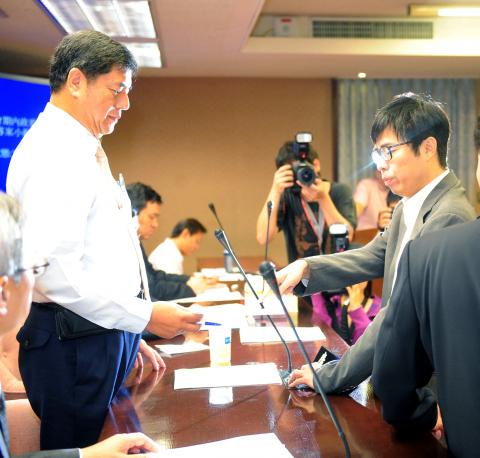
Photo: Wang Min-wei, Taipei Times
However, KMT legislators on the committee yesterday tabled a proposal to change the deadline back to its original date, triggering protests from their DPP counterparts, who took turns speaking at the podium to explain why they are opposed to moving the deadline back.
As Tuan was speaking, Chang suddenly asked the committee to vote on the KMT motion and quickly declared that it had passed, so the deadline was restored to May 31.
“Do you know the price you have to pay to run a tank through the committee meeting?” Tuan said in reaction to Chang’s move.
“This is too much, how could you hold a vote and declare a motion passed while a legislator is still talking on the podium?” DPP Legislator Lee Chun-yi (李俊俋) said.
Ignoring the protests, Chang called the meeting to an end and promptly left the room.
“Chang has planted a bomb in the Internal Administration Committee,” Tuan said. “We will see what happens on Wednesday [during the next meeting].”
After the meeting, DPP lawmakers condemned what they called the KMT’s “rude” behavior at a press conference.
“It’s clear that by changing the document request deadline from Aug. 31 — the date agreed upon at last week’s committee meeting — to May 31, the KMT is trying to prevent the public from knowing the truth behind the [cross-strait service trade pact] negotiations,” Chen said.
If the deadline is at the end of the month, there will not be enough time to request and collect the required documents, he added.
Chen said he would convene another committee meeting next week to again extend the document request deadline.
There is only one reason the KMT wants to move the deadline forward: To pass the supervision statute and the service trade pact in the current legislative session or an in extra session, if there is one, Lee added.
“I’d like to remind KMT legislators that the ‘black-box procedure’ [critics’ term for the bilateral trade negotiations] is what triggered the Sunflower movement. They should not have produced another black box,” Lee said.
Additional reporting by Chris Wang
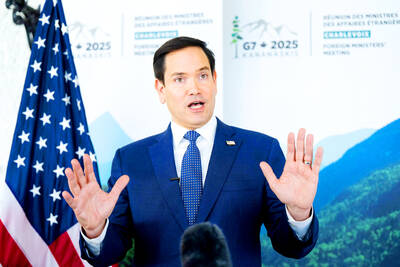
‘CROWN JEWEL’: Washington ‘can delay and deter’ Chinese President Xi Jinping’s plans for Taiwan, but it is ‘a very delicate situation there,’ the secretary of state said US President Donald Trump is opposed to any change to Taiwan’s “status quo” by force or extortion and would maintain that policy, US Secretary of State Marco Rubio told the Hugh Hewitt Show host on Wednesday. The US’ policy is to maintain Taiwan’s “status quo” and to oppose any changes in the situation by force or extortion, Rubio said. Hewitt asked Rubio about the significance of Trump earlier this month speaking with Taiwan Semiconductor Manufacturing Co (台積電) chairman C.C. Wei (魏哲家) at the White House, a meeting that Hewitt described as a “big deal.” Asked whether the meeting was an indication of the
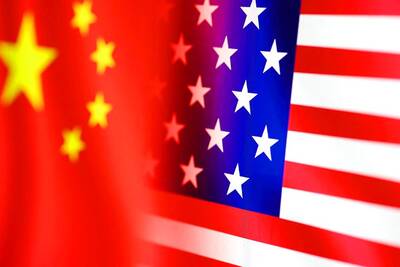
‘RELATIVELY STRONG LANGUAGE’: An expert said the state department has not softened its language on China and was ‘probably a little more Taiwan supportive’ China’s latest drills near Taiwan on Monday were “brazen and irresponsible threats,” a US Department of State spokesperson said on Tuesday, while reiterating Washington’s decades-long support of Taipei. “China cannot credibly claim to be a ‘force for stability in a turbulent world’ while issuing brazen and irresponsible threats toward Taiwan,” the unnamed spokesperson said in an e-mailed response to media queries. Washington’s enduring commitment to Taiwan will continue as it has for 45 years and the US “will continue to support Taiwan in the face of China’s military, economic, informational and diplomatic pressure campaign,” the e-mail said. “Alongside our international partners, we firmly
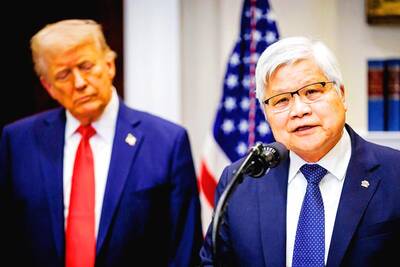
KAOHSIUNG CEREMONY: The contract chipmaker is planning to build 5 fabs in the southern city to gradually expand its 2-nanometer chip capacity Taiwan Semiconductor Manufacturing Co (TSMC, 台積電), the world’s biggest contract chipmaker, yesterday confirmed that it plans to hold a ceremony on March 31 to unveil a capacity expansion plan for its most advanced 2-nanometer chips in Kaohsiung, demonstrating its commitment to further investment at home. The ceremony is to be hosted by TSMC cochief operating officer Y.P. Chyn (秦永沛). It did not disclose whether Premier Cho Jung-tai (卓榮泰) and high-ranking government officials would attend the ceremony. More details are to be released next week, it said. The chipmaker’s latest move came after its announcement earlier this month of an additional US$100 billion
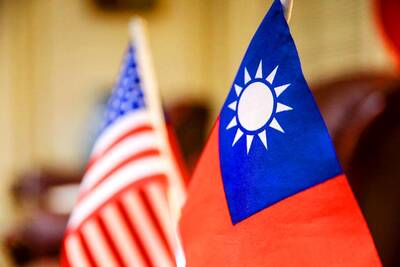
COUNTERING THE PLA: While the US should reinforce its relations with partners and allies, Taiwan must invest in strengthening its defenses as well, Phillip Davidson said If influence in the Indo-Pacific region is one of the US’ core interests, then Taiwan serves as a cornerstone of US economic and security influence in the region, former US Indo-Pacific Command commander admiral Phillip Davidson said on Thursday. “China’s ... strategy is to supplant the US leadership role in the international order ... and they’ve long said ... that they intend to do that by 2050,” Davidson told the National Review Institute’s Ideas Summit in Washington. Davidson said he had previously told US Senate hearings on China’s military activities and possible threats in the Indo-Pacific region that a Chinese invasion of